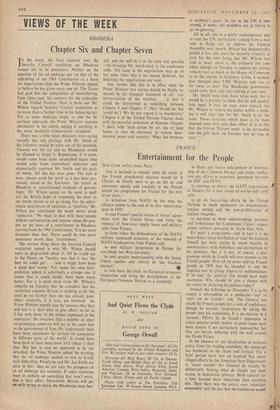VIEWS OF THE WEEK
RHODESIA
Chapter Six and Chapter Seven
Ithe event, the Tory concern over the 'Security Council resolution on Rhodesia turned out to be premature. Neither on the
question of the oil embargo nor on that of the upholding of the 1961 Constitution as a basis for negotiations does the Prime Minister appear to believe he has given away one jot. The Tories had paid him the compliment of remembering. from times past, his concern for the principles of the United Nations. Now it turns out Mr. Wilson regards Security Council resolutions as no more than a further item in his balancing act. Try as some madcaps might to end the bi- partisan approach, the Prime Minister remains obstinately in the centre, edging if anything to the more moderate Conservative viewpoint.
There was a time when ministers were saying roundly that any dealings with Mr. Smith or his followers would be quite out of the question. Treason was the cry and no Rhodesian would be allowed to forget it. Repentance, if it came, would come from some unspecified figure who would arise from somewhere unknown and dramatically confront Mr. Smith and his pack of rebels. All this has now gone. The task is now, almost word for word as it has been pre- viously stated in the Spectator, 'the return of Rhodesia to constitutional methods of govern- ment.' Mr. Wilson agrees on the need to spell out the British hope of reopening the door to the Smith regime as we go along. For the unfor- tunate description of sanctions as 'punitive,' Mr. Wilson has substituted the much better word `vindictive.' We want to deal with these people. without recrimination and rancour about the past, but on the basis of a resettlement in Rhodesia starting from the 1961 Constitution.' It is no more dramatic than that. There could be few more innocuous words than 'resettlement.'
The curious thing about the Security Council resolution indeed is why Mr. Wilson should seem so disgruntled about it. All he could say in the House on Tuesday was that it was 'the best we could get'. . . 'and it might have been a good deal worse.' Yet, under his own inter- pretation, which is admittedly a strange one, it seems that it could hardly have been much better. For it is quite plain from Mr. Wilson's remarks on. Tuesday that he considers that the resolution commits Britain to nothing at all. She need go no further than she has already gone. Other countries, it is true, are involved: the Prime Minister merely says he 'assumes that they will feel it is their duty to give effect, so far as it lies with them, to the wishes expressed in the resolution.' He imagines that a number of other oil-producing countries will act in the same way as the government of Iran. He 'understands there have been statements by various oil companies in different parts of the world.' It would have been hard to have been more lofty about it than that. But just in case he appeared to be too detached, the Prime Minister added the warning that the oil embargo seemed to him to bristle with difficulties. Plainly he and Mr. Ian Smith are alike in this: they do not take the prospects of an oil embargo too seriously. If other countries want to embark on something that won't work, that is their affair. Meanwhile, Britain will get on with trying to tackle the Rhodesian issue her-
self, and she will do it in the only way possible —by bringing Mr. Smith back to the conference table. The lapse in the negotiations may go on for some time; this is no reason, however, for believing the negotiations are over.
Any doubts that this is in effect what the Prime Minister was saying should be finally re- moved by his strangest statement of all: 'our interpretation of the wording . . is that it could be interpreted as something between Chapter 6 and Chapter 7.' (Not 'should be' but 'could be.') 'We do not regard it as mandatory.' Chapter 6 of the United Nations Charter deals with the peaceful settlement of disputes. Chapter 7 deals with 'such action by air, sea or land forces as may be necessary to restore inter- national peace and security.' What lies between
is anybody's guess. So far as the UN is con- cerned, it seems, the members are at liberty to go on guessing.
All in all, this is a pretty contemptuous way to treat the UN, particularly coming from a man who is flying out to address the General Assembly next month. Britain has demonstrably pulled a fast one over the Security Council, at least for the time being, but Mr. Wilson was rash to boast about it. He evidently felt con- fident enough on Tuesday to address his closing remarks not so much to the House of Commons as to the regime in Salisbury. Little, it seemed, had changed since UDI. Majority rule. was as far away as ever. The Rhodesian government could come back and start talking at any time.
Mr. Smith must duly have taken note, but it would be a mistake to think that he will quickly take heed. It may be easy, even natural, for Mr. Wilson to reverse his policy within a week. but it will take tiroe for Mr. Smith to do the same. Those sanctions which have so far been imposed must first take their effect. It is of this that the United Nations needs to be persuaded and the glib show. on Tuesday was no way to start.-


















































 Previous page
Previous page